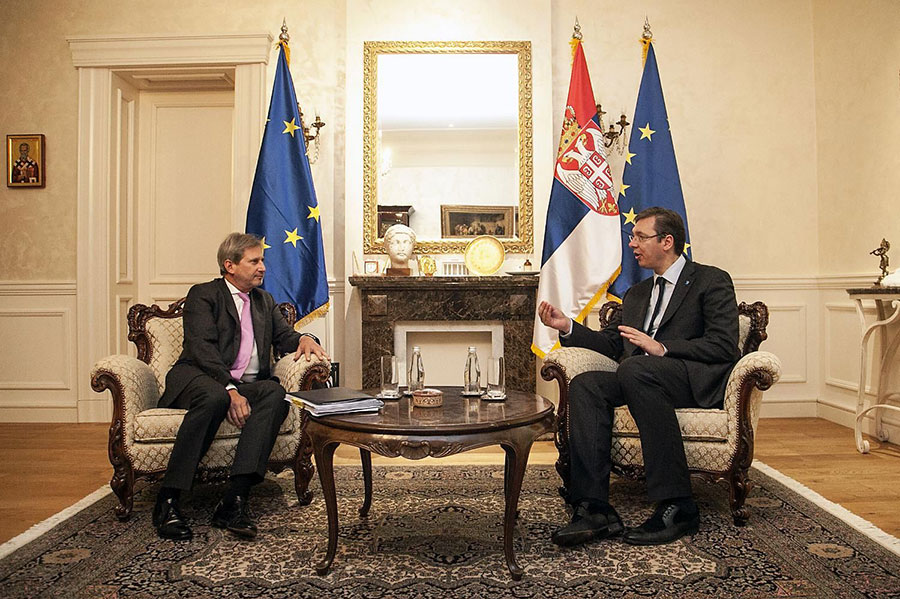European Commissioner for Neighbourhood Policy and Enlargement Negotiations Johannes Hahn expects 14 December intergovernmental conference to mark the beginning of Serbia’s EU accession process and hopes to see the opening of negotiating Chapters 23 and 24 in early 2016.
During his visit to Belgrade, Commissioner Hahn met with Serbian Prime Minister Aleksandar Vucic, following his speech at the National Assembly of Serbia.
At the press conference jointly held with Prime Minister Vucic, Hahn said that in early 2016 Serbia would open Chapters 23 and 24 within EU accession negotiations.
Hahn commended Serbian Government for the advance it had made in convergence to the EU, but stressed that “the real work has only begun” and that “the race has only started.”
Asked by the press to explain the influence of Chapter 35 on the EU accession process, Commissioner Johannes Hahn said “the EU saw a common vision for all countries in the region,” reminding that the pace of negotiations was decided by the EU Member States.
Serbian Prime Minister Aleksandar Vucic said Serbia wanted to complete accession negotiations by 2019. “Before the opening of chapters started, I reiterate that our intention is to have the serious reforms completed by 2019. Then it will be up to the EU to decide whether it would admit us into the Union,” Prime Minister Vucic told press following his meeting with Hahn.
He also thanked Head of the EU Delegation to Serbia Michael Davenport for his commitment to Serbia’s European path and his ability to exert pressure on Serbia and understand its actions.
Hahn’s Message to Serbian MPs: Serbia Belongs with European Family
Before meeting with Prime Minister, Commissioner for European Neighborhood Policy and Enlargement Negotiations Johannes Hahn addressed Serbian MPs and said the opening of the first chapters within Serbia’s EU accession process “marks the beginning of the substance of our accession process” and make the perspective of Serbia’s joining the EU family not just an idea, but a tangible and reachable objective.

Photo: FoNet
“The upcoming inter-governmental conference will show that the EU delivers on its commitments once countries make the necessary progress,” said Commissioner Hahn and added he was confident that the conference would allow the sound implementation of necessary reforms.
“What is needed now is a renewed commitment to move decisively forward with reforms, in particular in the areas of the judiciary, the fight against corruption, freedom of expression – which is non-negotiable from EU perspective,” said Hahn and added that “reforms within public administration, anti-discrimination and the economy are also necessary.” “Equally important is further progress in normalisation of relations with Kosovo, which is key to moving forward through accession negotiations.“
In his speech Johannes Hahn pointed to the importance of Serbian Parliament as “a key” actor in the process of European integration. “Here I must stress the importance of ensuring a cross-party and nationwide consensus on the next steps in the EU integration process. This will ensure lasting reforms,” he said.
Hahn highlighted Serbia’s constructive commitment to regional cooperation and good neighbourly relations because, according to him, the enlargement process should be an anchor for building stability in the region.
“We simply cannot afford any backsliding either in terms of reforms being slowed down or regional ties being loosened or even broken again,” Hahn said and commended the cooperation among countries in the region within Berlin process.
He also said Serbia was an important foreign policy partner for the EU.
“We have all been impressed by the responsible handling of Serbia’s Chairmanship in Office of the OSCE during 2015 and the successful handling of last week’s Ministerial in Belgrade,” Hahn said.
“Because a European Serbia is part of our common vision. There should be no doubt about it. The whole European Union, that is, its institutions and the 28 Member States, firmly stand by Serbia’s European perspective,” said European Commissioner Hahn.
He reminded that the EU was the biggest assistance provider with 200 million euros each year in grants, without counting the unprecedented 170 million euros provided in the aftermath of last year´s dramatic floods and support in dealing with refugee crisis.

Photo: FoNet
The European Union is not only Serbia’s top partner in terms of trade, investment, and favourable loans. The EU also “invests” in Serbia’s youth, said Hahn. “This is the best possible investment. More than 1600 Serbian students will have benefitted from the Erasmus programme in 2015. I hope that this number will continue to grow in the years to come, because today’s younger generation will shape tomorrow’s Europe.”
“A lot of work lies ahead of us. But I am confident that together, as partners and friends, we will handle the next steps smoothly and soon open a new chapter of our common history to bring Serbia where it belongs: into the European family,” said European Commissioner Hahn in his speech before the National Assembly of Serbia.




